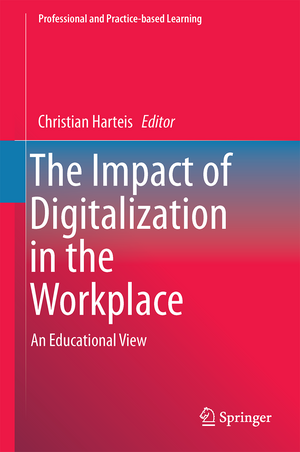The Impact of Digitalization in the Workplace: An Educational View: Professional and Practice-based Learning, cartea 21
Editat de Christian Harteisen Limba Engleză Hardback – 10 oct 2017
| Toate formatele și edițiile | Preț | Express |
|---|---|---|
| Paperback (1) | 679.14 lei 38-44 zile | |
| Springer International Publishing – 22 aug 2018 | 679.14 lei 38-44 zile | |
| Hardback (1) | 784.61 lei 6-8 săpt. | |
| Springer International Publishing – 10 oct 2017 | 784.61 lei 6-8 săpt. |
Din seria Professional and Practice-based Learning
- 18%
 Preț: 887.24 lei
Preț: 887.24 lei - 18%
 Preț: 891.48 lei
Preț: 891.48 lei - 18%
 Preț: 950.52 lei
Preț: 950.52 lei - 18%
 Preț: 950.03 lei
Preț: 950.03 lei - 18%
 Preț: 1112.30 lei
Preț: 1112.30 lei - 24%
 Preț: 836.00 lei
Preț: 836.00 lei - 15%
 Preț: 641.85 lei
Preț: 641.85 lei -
 Preț: 394.87 lei
Preț: 394.87 lei - 15%
 Preț: 651.19 lei
Preț: 651.19 lei -
 Preț: 394.51 lei
Preț: 394.51 lei - 18%
 Preț: 1240.30 lei
Preț: 1240.30 lei - 15%
 Preț: 651.84 lei
Preț: 651.84 lei - 15%
 Preț: 649.39 lei
Preț: 649.39 lei - 15%
 Preț: 700.75 lei
Preț: 700.75 lei - 18%
 Preț: 733.96 lei
Preț: 733.96 lei - 15%
 Preț: 648.89 lei
Preț: 648.89 lei - 18%
 Preț: 943.57 lei
Preț: 943.57 lei - 18%
 Preț: 1014.89 lei
Preț: 1014.89 lei -
 Preț: 391.22 lei
Preț: 391.22 lei - 15%
 Preț: 647.08 lei
Preț: 647.08 lei - 15%
 Preț: 700.29 lei
Preț: 700.29 lei - 15%
 Preț: 652.64 lei
Preț: 652.64 lei - 18%
 Preț: 886.62 lei
Preț: 886.62 lei - 15%
 Preț: 637.28 lei
Preț: 637.28 lei - 18%
 Preț: 946.41 lei
Preț: 946.41 lei - 18%
 Preț: 939.33 lei
Preț: 939.33 lei - 24%
 Preț: 864.87 lei
Preț: 864.87 lei - 18%
 Preț: 960.78 lei
Preț: 960.78 lei - 15%
 Preț: 635.31 lei
Preț: 635.31 lei
Preț: 784.61 lei
Preț vechi: 956.84 lei
-18% Nou
Puncte Express: 1177
Preț estimativ în valută:
150.13€ • 156.76$ • 123.98£
150.13€ • 156.76$ • 123.98£
Carte tipărită la comandă
Livrare economică 15-29 aprilie
Preluare comenzi: 021 569.72.76
Specificații
ISBN-13: 9783319632568
ISBN-10: 3319632566
Pagini: 235
Ilustrații: VIII, 235 p. 17 illus.
Dimensiuni: 155 x 235 x 21 mm
Greutate: 0.52 kg
Ediția:1st ed. 2018
Editura: Springer International Publishing
Colecția Springer
Seria Professional and Practice-based Learning
Locul publicării:Cham, Switzerland
ISBN-10: 3319632566
Pagini: 235
Ilustrații: VIII, 235 p. 17 illus.
Dimensiuni: 155 x 235 x 21 mm
Greutate: 0.52 kg
Ediția:1st ed. 2018
Editura: Springer International Publishing
Colecția Springer
Seria Professional and Practice-based Learning
Locul publicării:Cham, Switzerland
Cuprins
1. Machines, change, work: An educational view on the digitalization of work (Christian Harteis).- Part I: Changes in the workplaces through digitalization.- 2. Mind or machine? Opportunities and limits of automation (Petri Nokkelainen, Timo Nevalainen, & Kreeta Niemi).- 3. Collaborative systems and environments for future working life – towards the integration of workers, systems and manufacturing environments (Raja Hämäläinen, Minna Lanz, & Kari Koskinen).- 4. Digitalization of production, human capital, and organizational capital (Martin Schneider).- Part II: Educational challenges on individual level.- 5. ICT skills and competencies for SMEs: Results from a structured literature analysis on the individual level (Franz Lehner & Mathias Sundby).- 6. Effects of digitalized and flexible workplaces on parenthood – new concepts in gender relations or a return to traditional gender roles? (Anne-Dorethee Warmuth & Ilke Glockentöger).- 7. Learning in the context of work in a digital age:The use of digital media in informal and formal learning contexts (Sin Sing Ang, Mariana Orozo, David Gijbels, & Piet Van den Bossche).- 8. Integrated digitized video recordings in post-flight simulator training: A matter of reflection (Yoriko Kikkawa & Timothy J. Mavin).- Part III: Educational challenges on organizational level.- 9. IT capabilities for SMEs: An analysis at the organizational level (Franz Lehner & Mathias Sundy).- 10. Supporting the change to digitalized production environments through learning organization development (Christoph Fischer & Alexander Pöhler).- 11. Agency and learning in the work of software professionals (Katja Vähäsantanen & Anneli Eteläpelto).- PART IV: Educational challenges on societal level.- 12. Information privacy in a digitalized world: Private issue or public matter? (Franz Lehner & Aleksandra Dzepina).- 13. Accessing and securing conceptual and symbolic knowledge required for digital era work (Stephen Billett).- 14. The digitalization of workand social justice – reflections on the labour process of English Further Education teachers (James Avin & Cheryl Reynolds).
Textul de pe ultima copertă
This edited volume brings together researchers from various disciplines (i.e. education, psychology, sociology, economy, information technology, engineering) discussing elementary changes at workplaces occurring through digitalization, and reflecting on educational challenges for individuals, organizations, and society. The latest developments in information and communication technology seem to open new potential, and the crucial question arises which kind of work can be replaced by technology? The contributors to this volume are scholars who have been conducting research on the influence of technological change on work and individuals for a long time. The book addresses researchers as well as practitioners in the field of adult education and human resource development.
Caracteristici
Highlights threats and opportunities arising from the digitalization of work Discusses how best to prepare workers for this future of work Reflects on forecasts for the labour market
